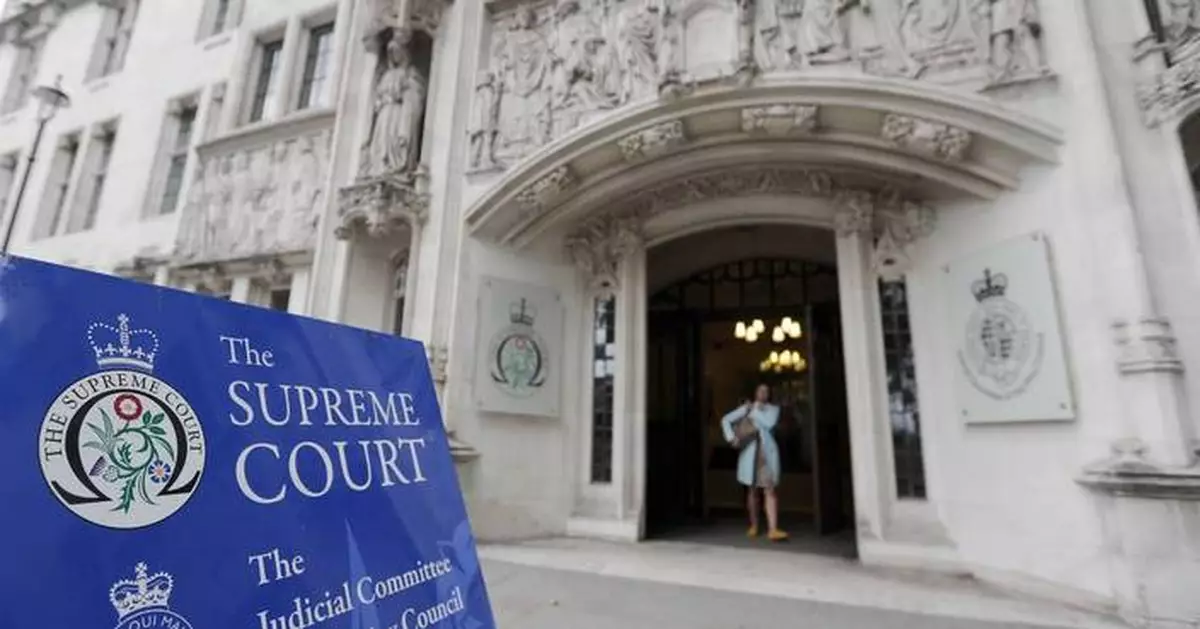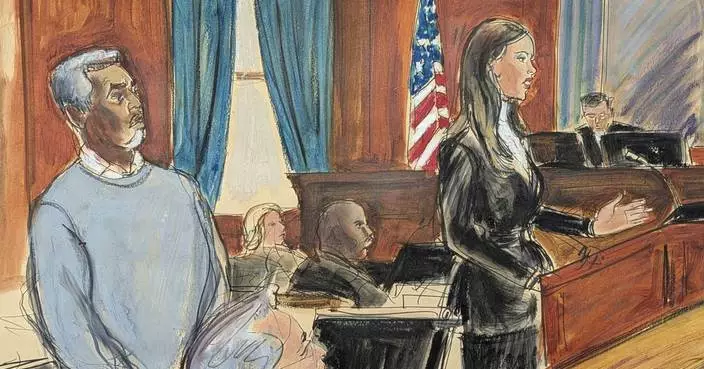LONDON (AP) — Transgender women will be excluded from women’s toilets, hospital wards and sports teams after a U.K. Supreme Court ruling, the head of the Equality and Human Rights Commission said Thursday, as trans groups digested a judgment that could have a broad and detrimental impact on daily life.
While Britain’s highest court said there was no clear winner in its ruling defining a woman for anti-discrimination purposes as someone born biologically female, noting that transgender people remain protected from discrimination, trans groups said the decision would undermine their rights.
Equality Commission Chairwoman Kishwer Falkner said the “enormously consequential” ruling brought clarity and would prompt her organization to update public codes by summer to comply.
“Single-sex services like changing rooms must be based on biological sex," she told the BBC. “If a male person is allowed to use a women-only service or facility, it isn’t any longer single-sex, then it becomes a mixed-sex space."
The ruling Wednesday came in a case that had nothing to do with those spaces, but stemmed from a 2018 law passed by the Scottish Parliament that required at least 50% women on boards of Scottish public bodies. Transgender women with gender recognition certificates were to be included in meeting the quota.
But the court said that using a certificate to interpret someone's sex would clash with definitions of man and woman and, therefore, the anti-discrimination provisions of the 2010 Equality Act could “only be interpreted as referring to biological sex.”
Out of some 66 million people in England, Scotland and Wales, about 116,000 identified as trans in the latest census count. About 8,500 gender recognition certificates have been issued.
The feminist group that brought the court case said the outcome provided common sense, protected same-sex spaces for women and brought clarity to the thorny issue. But trans groups said it had caused fear and uncertainty.
Trans activist jane fae, a director of the group TransActual, said she worried the ruling would mean “total exclusion and segregation” of trans women.
“No trans women in women’s changing rooms, no trans women in women’s loos, no trans women in women’s sports," fae said.
“The number of people I have come across on social platforms, on forums, etc., saying ‘How do I go on? I am in tears, I’m in pieces. I am shattered. I am broken,’" fae said. "That seems to be pretty much a unanimous reaction.”
Gendered Intelligence, a charity dedicated to understanding gender diversity and improving trans lives, said its support services had been overwhelmed with calls from people worried about whether they'd be able to return to their soccer team next week, receive medical care or get support for domestic violence.
“The fear and the despair is very, very real,” said spokesperson Cleo Madeleine. “And in all of this talk of whether or not people are going to be excluded, whether or not people are going to be banned, there’s been no real sense of what we’re supposed to do if we are.”
Falkner noted that there was no law requiring single-sex spaces and she encouraged trans groups to advocate for neutral spaces such as unisex toilets or changing rooms.
Gender identity has not been as divisive in the U.K. as the U.S., where it has created political firestorms in some states, but the topic factors into Britain's own culture wars.
Newspapers have reported on a group of female nurses who sued their employer after they had to share a changing room with a male colleague who identifies as female, and about a nurse who was suspended for calling a transgender pedophile “mister.”
Chris Evans, editor of The Telegraph, a politically conservative London newspaper, said in its morning newsletter Thursday that the court had “declared that transgender women are not legally women,” and said it was looking into what the ruling means for “public bodies who have sacrificed women’s rights on the altar of inclusivity.”
British Transport Police announced it was reviewing its policies in light of the ruling and would temporarily change the way it conducts strip searches of transgender people in custody by assigning an officer of the same biological birth sex.
Falkner said her group would continue to defend the rights of trans people.
“They have rights, and their rights must be respected," she said. “It’s not a victory for an increase in unpleasant actions against trans people. We will not tolerate that."
But Madeleine said that Falkner had provided no sense of what the future holds for vulnerable people who may find themselves shut out of sports, counseling services and health care.
“My concern is that if the equalities minister does push for transgender people to be shut out from these spaces, as they say, there’s going to be nowhere else for them to go,” Madeleine said. “The message we’re getting, frankly, from the highest equalities office in the country is that they want to get rid of us, and they don’t really care where we go.”
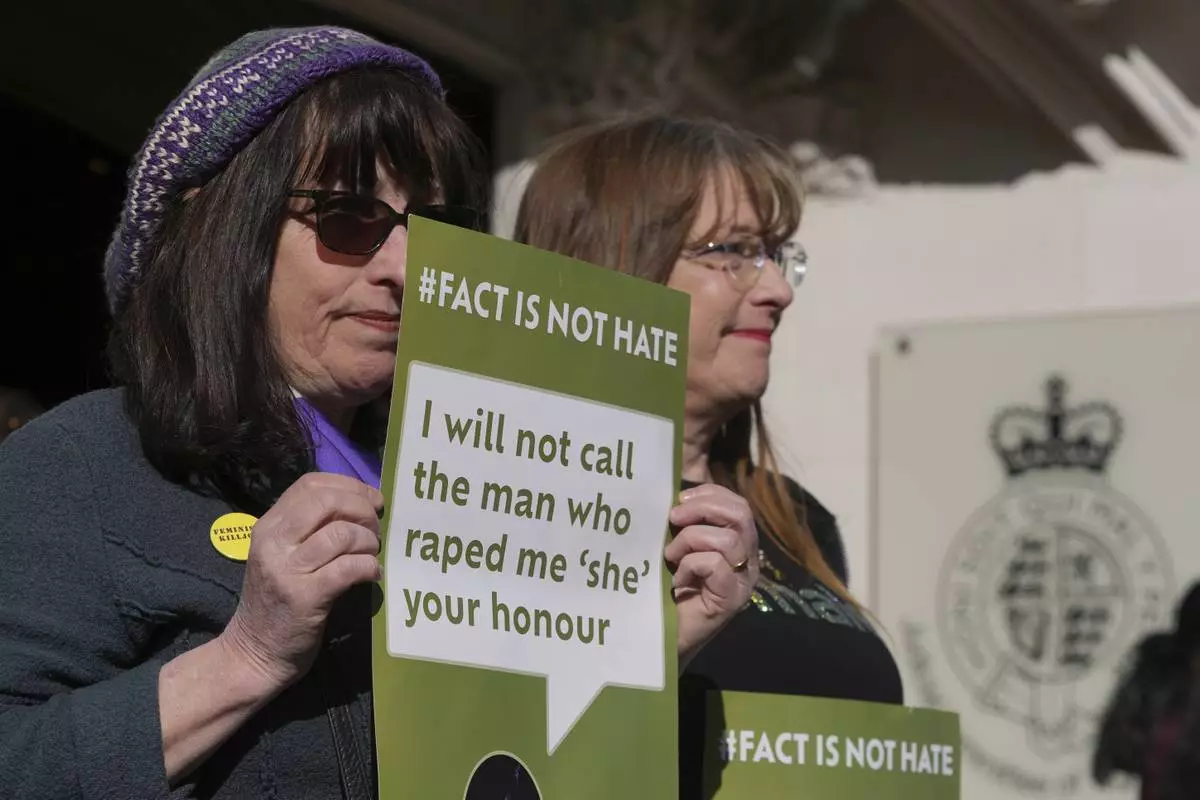
Women's rights activists hold placards outside the Supreme Court to challenge gender recognition laws, in London, Wednesday, April 16, 2025. (AP Photo/Kin Cheung)
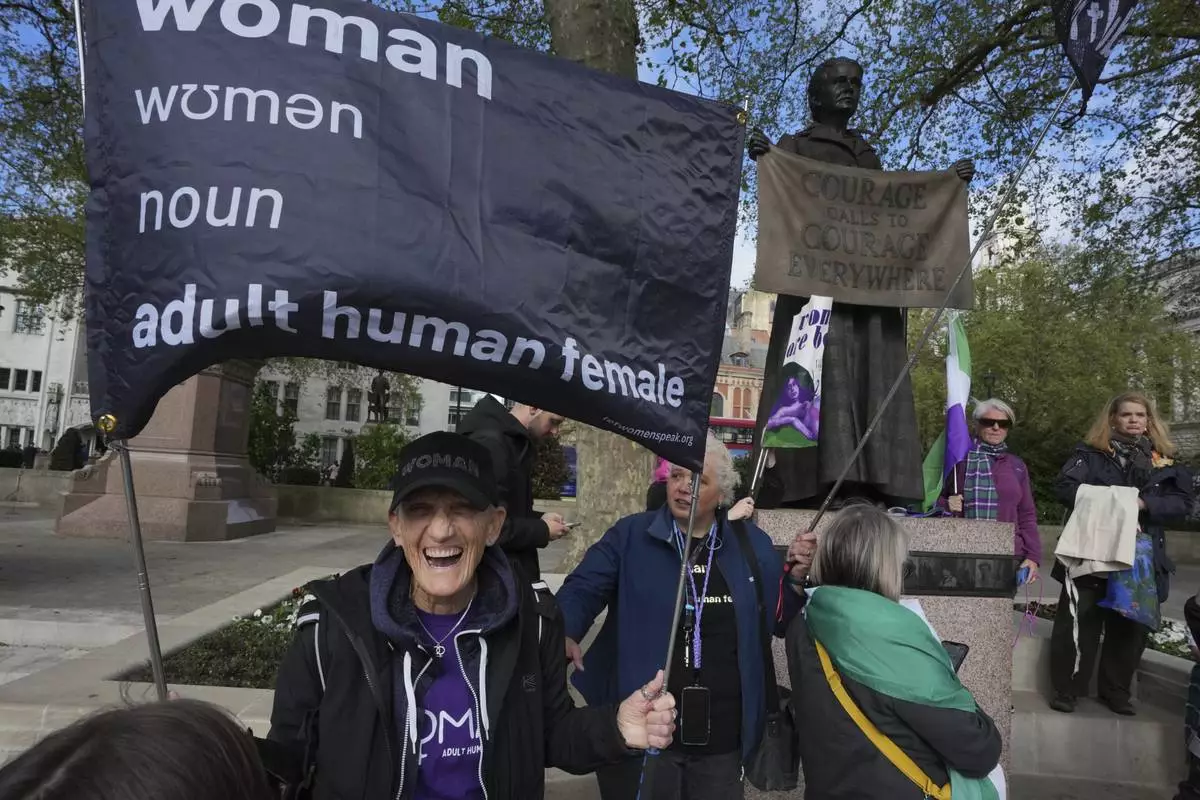
Women's rights activists hold placards outside the Supreme Court to challenge gender recognition laws, in London, Wednesday, April 16, 2025. (AP Photo/Kin Cheung)
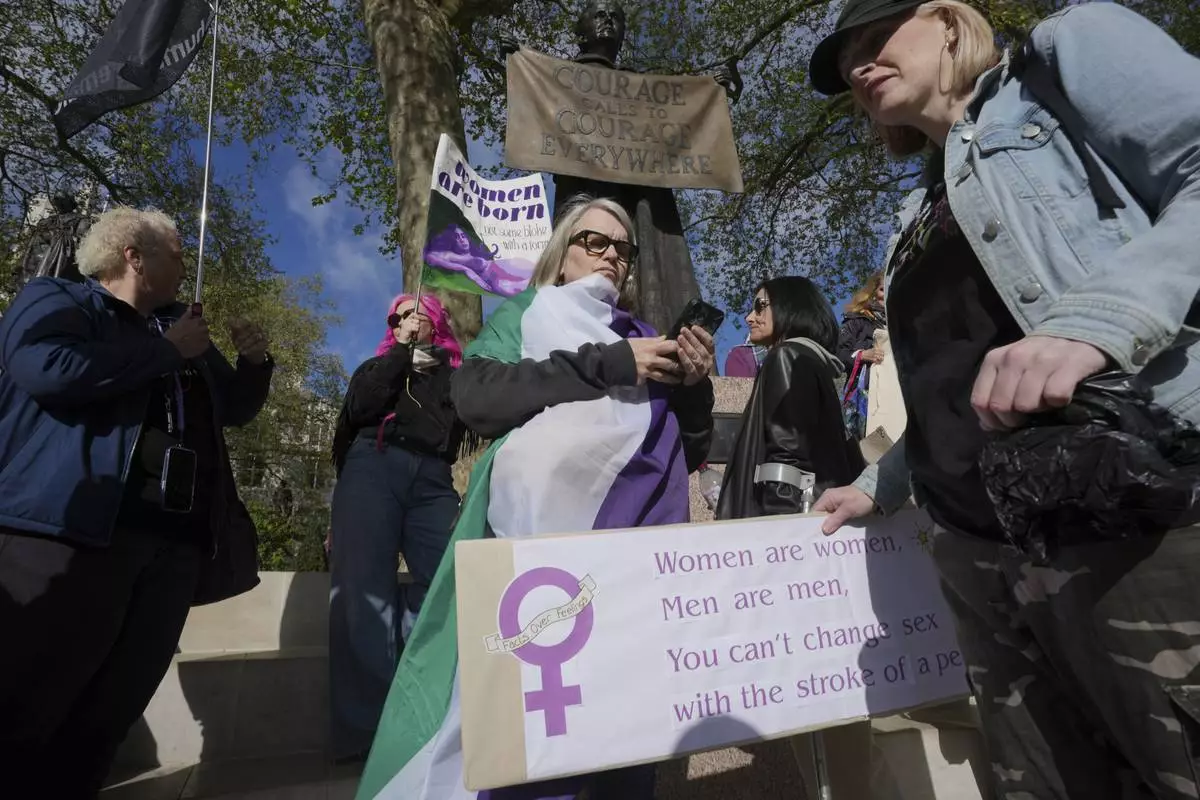
Women's rights activists hold placards outside the Supreme Court to challenge gender recognition laws, in London, Wednesday, April 16, 2025. (AP Photo/Kin Cheung)
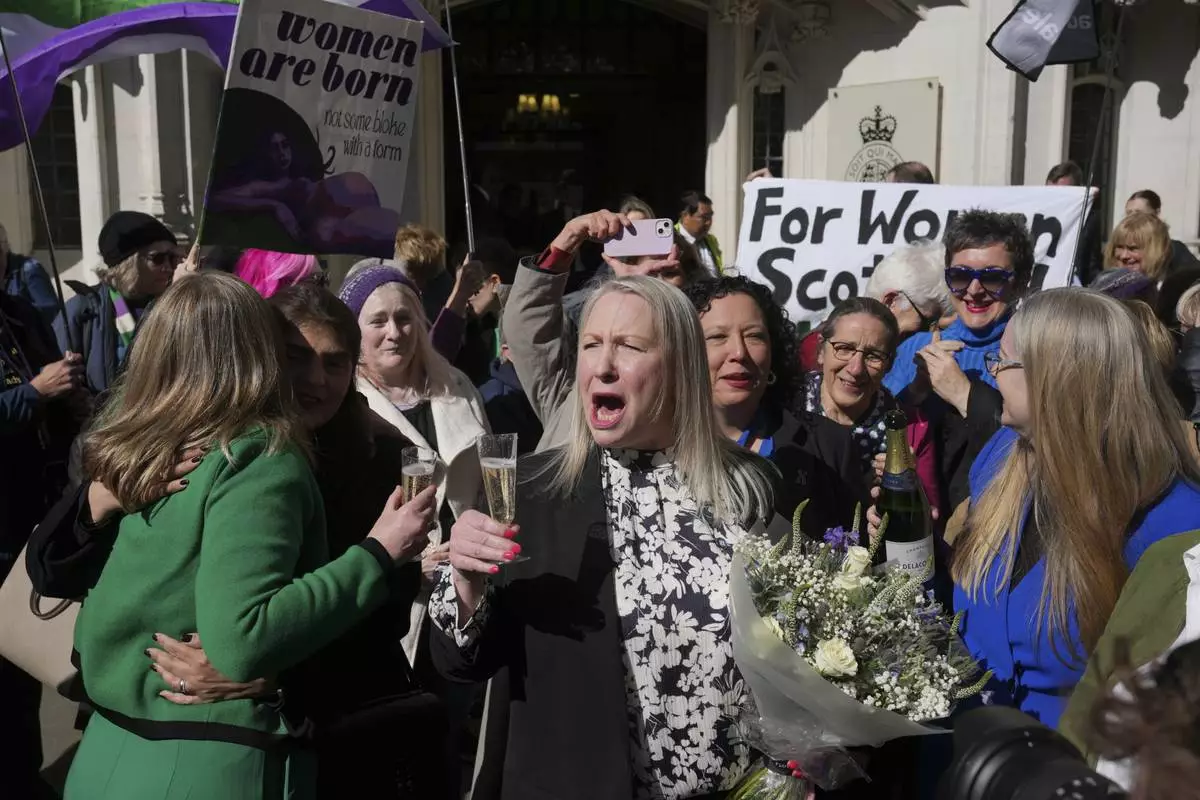
Marion Calder, center, and Susan Smith, left, from For Women Scotland, celebrate outside after the U.K. Supreme Court ruled that a woman is someone born biologically female, excluding transgender people from the legal definition in a long-running dispute between the feminist group and the Scottish government, in London Wednesday, April 16, 2025. (AP Photo/Kin Cheung)
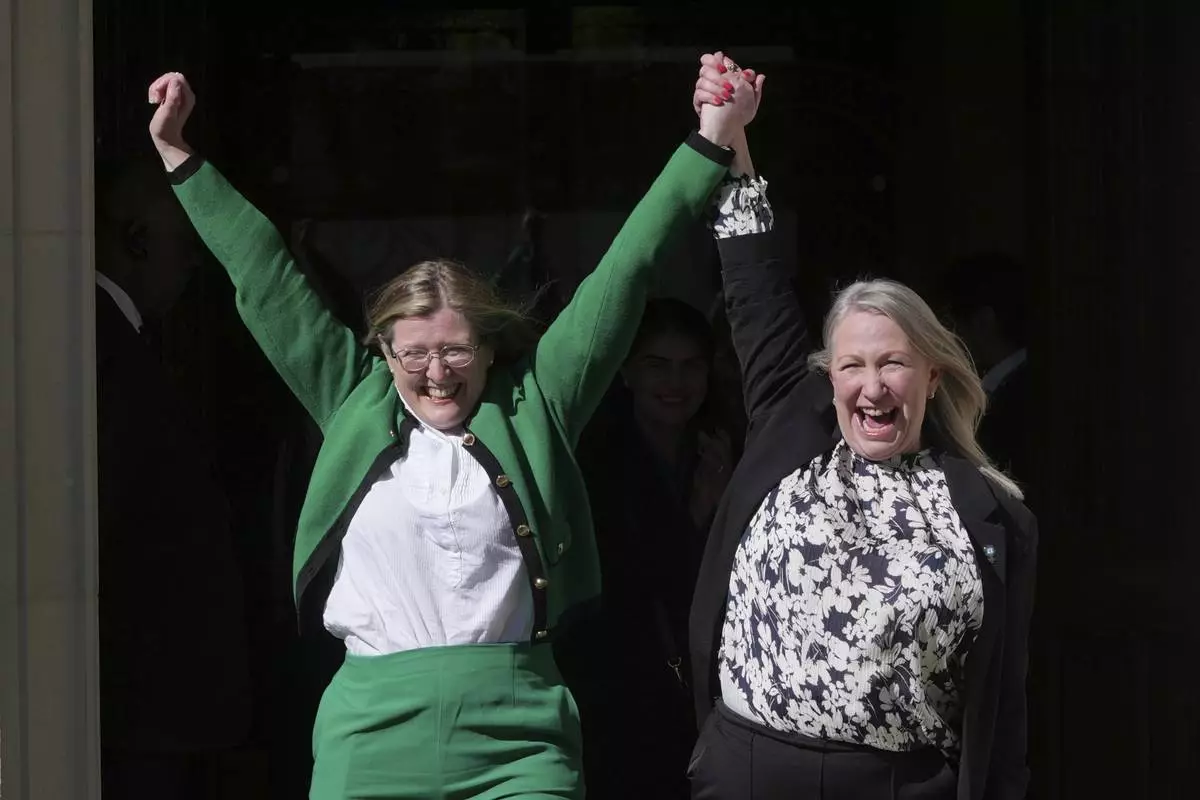
Marion Calder, right, and Susan Smith, left, from For Women Scotland, celebrate outside after the U.K. Supreme Court ruled that a woman is someone born biologically female, excluding transgender people from the legal definition in a long-running dispute between the feminist group and the Scottish government, in London Wednesday, April 16, 2025. (AP Photo/Kin Cheung)
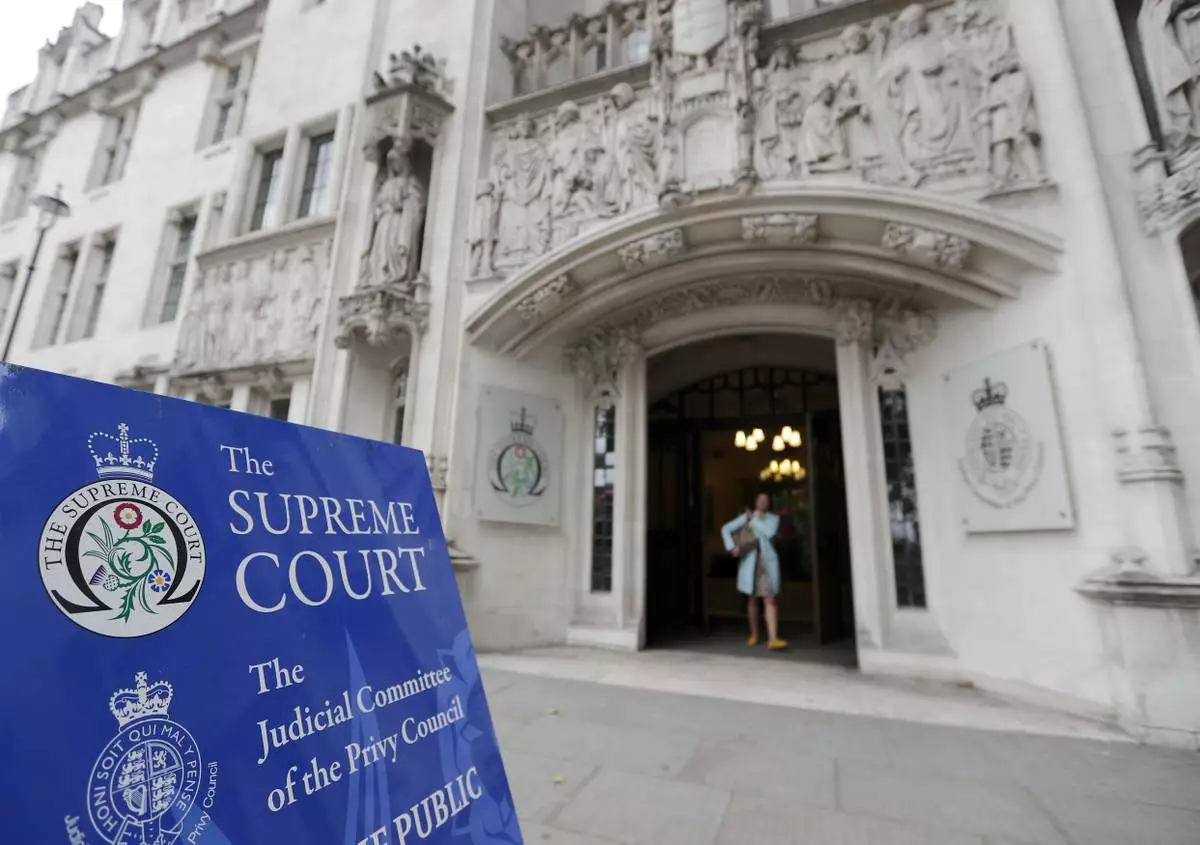
FILE - The entrance of the Supreme Court in London, Wednesday, Sept. 11, 2019. (AP Photo/Frank Augstein, File)


